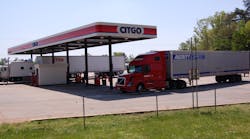Average prices for diesel and gasoline stayed relatively flat week-over-week across the U.S., with diesel falling 1.7 cents per gallon while gasoline increased 4/10ths of a penny per gallon. However, projections for two wintry blasts of arctic air that could affect a large swath of the Midwest and East Coast could create a spike in demand for heating oil – potentially driving up the cost of diesel over the next few weeks.
According to the Energy Information Administration (EIA), the U.S. average price for diesel dropped to $3.894 per gallon this week, though the agency noted that’s still 4 cents per gallon higher compared to the same week in 2012. Diesel prices fell in every region of the country except New England and California, which both witnessed a 1.5 cent per gallon increased for diesel.
Data tracked by EIA also pegged New England ($4.168 per gallon), the Central Atlantic ($4.094) and California ($4.063) as the areas of the country where diesel prices are highest.
Conversely, while the average U.S. price for gasoline increased a slim 4/10ths of a penny to $3.303 per gallon, that price is actually 8.8 cents cheaper versus the same week in 2012, EIA noted.
Gasoline prices were up in five regions of the U.S., while they dropped in the other five regions, leaving New England ($3.515 per gallon), the Central Atlantic ($3.513) and California ($3.491) as home to the highest gasoline prices in the nation, the agency said.
The EIA still expects oil and fuel prices to moderate over the next few years, though others believe the rising exploration and extraction costs for both oil and natural gas will spur prices higher.
The agency’s latest short-term energy forecast predicts that the Brent crude oil spot price, which averaged $112 per barrel in 2012, will fall to an average of $105 per barrel in 2013 and $99 per barrel in 2014. The projected discount of West Texas Intermediate (WTI) crude oil to Brent, which averaged $18 per barrel in 2012, falls to an average of $16 per barrel in 2013 and $8 per barrel in 2014.
As a result, EIA expects that drop in crude prices to result in lower national average retail diesel and gasoline prices, with diesel declined from an average of $3.97 per gallon during 2012 to an average of $3.87 per gallon in 2013 and $3.78 per gallon in 2014. Gasoline is also expected to slip from its average of $3.63 per gallon in 2012 to annual averages of $3.44 and $3.34 per gallon in 2013 and 2014, respectively, the agency said.
Yet experts interviewed for a story in The Christian Science Monitor newspaper believe those predictions are way off base, as the full cost of producing new oil for the 50 largest publicly traded oil companies in the world is $92 a barrel, according to Bernstein Research.
While average costs are lower because they include previously discovered conventional oil which is cheaper and easier to produce, the Bernstein report challenges the notion that new technologies will lead to cheaper oil – largely because the cost of producing even marginal new barrels of oil has been increasing by 14% per year since 2001.
“Finding, developing and producing new oil isn't getting cheaper; it's getting much more expensive,” the Bernstein report noted.



